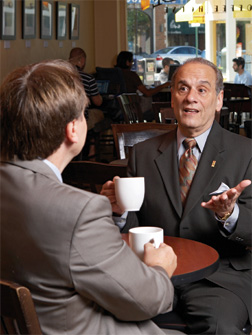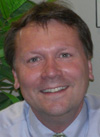 Wisconsin
Lawyer
Wisconsin
Lawyer
Vol. 81, No. 9, September
2008
A Long Cup of Coffee with SPD Nick Chiarkas
Nick Chiarkas, State Public Defender
for the past 20
years, reflects with Randy Kraft on current issues,
challenges, and controversies facing our justice system and the State
Public Defender's office.

by Randy Kraft
Sidebar:
 hen Israel's first National Public
Defender, Ken Mann, was putting
together its indigent defense program, he sought the advice of Wisconsin
State
Public Defender Nick Chiarkas. Included in Chiarkas's counsel was the
importance
of not staying behind one's desk but instead walking around and meeting
people, going to the public defender's different offices, and talking to
judges and
to the members of the legislature, not just as a goodwill ambassador but
also
to find out what concerns people have. "I call it a long cup of
coffee,"
Chiarkas said, "because it's cordial and it centers on
listening."
hen Israel's first National Public
Defender, Ken Mann, was putting
together its indigent defense program, he sought the advice of Wisconsin
State
Public Defender Nick Chiarkas. Included in Chiarkas's counsel was the
importance
of not staying behind one's desk but instead walking around and meeting
people, going to the public defender's different offices, and talking to
judges and
to the members of the legislature, not just as a goodwill ambassador but
also
to find out what concerns people have. "I call it a long cup of
coffee,"
Chiarkas said, "because it's cordial and it centers on
listening."
On the 20-year anniversary of Nick Chiarkas's tenure as
Wisconsin's State Public Defender, the author had "a long cup of
coffee" with Chiarkas
to get his reflections on the past two decades, including Chiarkas's
views on
current issues, challenges, and controversies facing the justice system
and
the State Public Defender's Office.
Kraft: Nick, you grew up in a New York City housing
project, became a
New York City police officer, and - eventually - now the Wisconsin State
Public Defender. It seems like an improbable and inconsistent journey.
Chiarkas: Not at all. There is a direct relationship between
growing up
poor and wanting to use my law license to represent poor people. Nor is
it
inconsistent with working as a police officer. I became a cop
because I didn't like bullies, and I became a public defender because I
see the state as having so much power
over a poor person accused of a crime who is presumed innocent. There is
a tendency for
government to bully the poor and less fortunate. Public defenders stand
and defend the
poorest citizen against the awesome power of the state, and by doing so
public
defenders fulfill the promise made in our Pledge of Allegiance to
protect "justice for all."
Kraft: I'm sure you've had the opportunity to see significant
changes in the agency
over the past 20 years. Let's first focus on the accomplishments - what
efforts are you
most proud of?
Chiarkas: I'm very proud of the fact that we're the only
public defender program in
the country to receive three quality awards; the last one at the mastery
level from
the Malcolm Baldrige-based Wisconsin Forward Award. That's a very
difficult thing to
achieve, and it shows that not only are we doing a great job
representing poor people, but
we're doing it in the most cost-effective way possible. We're not
skimping on quality, and
at the same time we're not overspending.
Because of this, we were asked by the U.S. State Department to
go to Israel and
Gaza to help develop their public defender systems; and later to Japan.
And we've had
contacts from many other countries. In addition, we're called on by
other states, the U.S.
State Department, and the U.S. Department of Justice and the National
Legal Aid &
Defender Association. For example, we were asked to help in Michigan and
Ohio, and after
Hurricane Katrina in New Orleans.
Kraft: In 20 years' time, the practice of law must have
changed. What have you
observed in regard to changes in practice?
Chiarkas: Because of overcrowding in some jails and prisons,
more and more clients
are locked up at locations further away from their attorneys. The
physical distances
involved make face-to-face communication more challenging, especially
when combined with
the caseload demands on our staff. At the same time we've seen an
increase in use of
video for court proceedings. The biggest push for video use in court has
been in bail
hearings and other proceedings in which the defendant is incarcerated.
These hearings also
pre-sent a challenge for us. For example, it is hard to speak privately
with the client
if the defense attorney is in the courtroom and the client is on a video
screen.
Perhaps the biggest change is reflected in the sheer numbers of
cases coming
through the door of the SPD. In the year I started, I believe we opened
just over 76,000
cases. Compare that to our case openings of over 136,000 in the last
fiscal year. These
are substantial changes not only to our practice, but to others in the
justice system -
especially if you factor in the harsher penalties that are in existence
now versus 20
years ago.
Kraft: What about changes or trends with the attorneys
themselves?

Randy Kraft is communications director of the
Wisconsin State Public Defender's Office
Chiarkas: We're starting to see more retirements of our
"lifers," the attorneys
who have served since the agency's inception back in the late 1970s.
With each retirement,
we lose a substantial body of knowledge. And at the same time, it's
harder financially
for younger attorneys to enter and remain in public service. We used to
have a salary
structure that provided competitive salary increases, called regrades,
in the first few
years of service. But the increases have been much lower in the last
decade, and retention is
a struggle. It's an even greater economic reality for our private bar.
Many private
attorneys can't afford to take our cases, at least not regularly.
Kraft: Let's look at the SPD's Office from an organizational
perspective. What
philosophies do you bring to your job?
Chiarkas: The agency owes much of its success to the fact that
we work as a team.
There isn't one person in the agency who's more important than another
person in the
agency. We're in this together; we're all equals working for the client.
The most important
person in this agency is the client.
Kraft: Organizationally, the SPD's Office is both a state
agency and a law firm.
Does this arrangement create any complications or tension?
Chiarkas: I don't think that these roles create problems
within the agency. But
there are tensions on certain issues from moment to moment. For example,
a couple of years
ago the Department of Administration wanted to consolidate our computers
with the rest of
the state. We explained that while we are a state agency and understood
that the DOA
wanted to consolidate all of the computers in the state, we are also a
law firm with
confidential client information. And in the end the DOA understood that
issue, and we
maintained control over our own computers.
Kraft: Wisconsin's indigent defense program is marked by a
statewide government
agency using both staff and private attorneys to provide legal
representation. How does
this model, Wisconsin's model, compare to the other structures that
you've seen?
Chiarkas: We have the best possible structure. But, that
doesn't mean there isn't
room for improvement; for example, we must increase our private bar pay
and update our
financial eligibility guidelines. As a statewide system, we have our
information
centralized. If something like a pandemic happened or some other
disaster occurred, having a
statewide system gives you a bank of information that you don't
otherwise have.
Another thing about a statewide system is that it's more
flexible. If suddenly
there is less crime in Milwaukee, and there's more crime in Green Bay,
we can transfer
people from one office to another. So it allows the reallocation of
resources wherever they
are needed.
It's also the most cost-effective option because you have only
one
infrastructure that's running the whole program. You don't have to
duplicate, for example, the
payroll or personnel function from county to county to county. You only
need one
centralized function. It's cost effective, it's taking care of the
clients, it's tracking
information, and it's more flexible. And it allows us to offer
uniformity in terms of our
practice and policies.
Kraft: You've seen the agency through some challenging times.
What do you feel were
the major challenges that the agency has faced during the past 20 years?
Chiarkas: When we were told to fire 50 attorneys back in 2001
- that certainly was
a challenge. We were successful in contesting that order, not only
because it was
just plain wrong to do that to peoples' lives, but it would actually
have cost taxpayers
twice as much for those cases to go to the private bar than to keep
those 50 attorneys
in place.
We're also facing huge challenges today. Many poor people in
this state do not
qualify for our representation. Our eligibility standards have not been
adjusted since the
1980s, and therefore a lot of people that are too poor to afford counsel
cannot be
represented by the SPD's Office. They're instead represented at county
expense, which is
considerably more expensive than if we - the state - represented them.
The rate at which we're allowed to pay our private bar is
another problem. When
we appoint a private attorney, we are only able to pay $40 per hour.
These are mostly
small business owners, and that amount doesn't even cover their basic
overhead expenses.
Wisconsin also leads the nation in disproportionate minority
contact and
confinement, and we should be embarrassed by this record. Wisconsin has
the reputation of being
a progressive state with a strong sense of right and wrong and justice.
This is a
different Wisconsin, and we ought to face this problem and correct it
immediately.
It's time to reevaluate truth-in-sentencing. Since
truth-in-sentencing was
enacted, prison, probation, and parole populations have almost doubled,
and they are growing
exponentially. It's time to stop it, fix it, and get it right.
There were other challenges along the way. We faced an audit in
the 1990s that
resulted in an increase in caseloads at the same time penalties were
increasing. Caseloads
were too high before the audit; nevertheless, they were raised. The
message was that
the least-favored citizens of this state, the poor, would get overworked
public defenders
and an underpaid private bar.
At the same time, prison spending was increased, and there was a
draconian rewrite
of the juvenile code. In Wisconsin, a 10 year old can be punished as an
adult. And,
for purposes of punishment, we also started calling 17 year olds
"adults." It was a
terrible moment in the history of justice and children in Wisconsin.
But our staff worked harder, representing children and adults
just as well as
they ever have. This agency has a hard-working and absolutely dedicated
staff.
Kraft: During the past 20 years, treatment courts and
diversion opportunities have
become more prevalent in Wisconsin. What role do you feel they should
have in our
justice system?
Chiarkas: I think they're the right direction, and their
expansion is a good
sign. People who scare us - violent, dangerous people - should be
removed from society. But
for people who have a drinking problem or a drug problem or whatever
else the problem is,
we should find and require treatment, correct behavior, and keep them in
society. Why?
Because it's more effective and it's less expensive. It's smart on crime
and it should
be the foundation of Wisconsin's long-term solution.
Kraft: The possibility of reinstating the death penalty in
Wisconsin came up a few
years back. In fact, Wisconsin voters were faced with an advisory
referendum on the issue.
What role should the death penalty play in our justice system?
Chiarkas: None at all. It's very expensive, and too often an
innocent person is
executed. The only thing that it does satisfy is our dark urge for
vengeance. We need to
check that feeling and then with reason and common sense decide what's
the smartest thing
to do. Life without parole is just as secure as, and less expensive
than, the death penalty.
Kraft: During the last Wisconsin Supreme Court justice
campaign, comments were
expressed about public defenders that many felt were negative. What was
your reaction to
these comments?
Chiarkas: I think it was startling. For a sitting judge in
America to state he is
on the side of law enforcement and to suggest that he holds public
defenders in low
esteem is simply startling to me. It's in sharp contrast to everything
our American
justice system stands for. And in light of the racial disparity problem
we're facing in
Wisconsin, it was offensive that a sitting judge would run ads that
showed his black
judicial opponent alongside a black defendant while a background audio
stream suggested that
this particular judicial candidate supports crime and criminals because
he was a public
defender. It was a sad moment for justice in Wisconsin.
Kraft: We've been talking about the criminal side of the law;
let's talk about the
civil side for a moment. The recent Access to Justice Initiative Report,
for instance,
focused on this issue. How do you view this holistic approach?
Chiarkas: It's extremely important. I think one of the big
mistakes the legal
profession made was to separate criminal and civil law. Most people have
problems that go
well beyond just the criminal act. For example, a mother who steals
bread from a grocery
store to feed her children who are sleeping under a cardboard box in the
alley needs a lot
more assistance than just a public defender to represent her on a theft
charge. If you
provide poor people with holistic treatment, you will also find that you
will change their
criminal behavior as well.
Kraft: Earlier you mentioned your travels to foreign
locations, such as Israel,
Gaza, Japan, Germany, and so on. What have you learned from these
experiences?
Chiarkas: That in every community, the idea of representing
poor people accused
of crimes is both laudable and embraced. But at the same time, there is
a reluctance
to spend resources on it, whether it's in Israel or in Gaza or in Japan.
And because
of cultural differences you cannot, and ought not, impose an American
ideal in another
country. You have to listen to what the culture says, and you must
tailor the right to
counsel and the rule of law to fit the particular culture.
Kraft: In recent years, you've been called on in greater
frequency to work with
indigent defense programs within the United States such as in Michigan,
Ohio, and Louisiana.
How do your experiences with other states compare to your experiences
abroad?
Chiarkas: No matter the culture, it really comes down to the
same thing. Whether
we're talking about New Orleans, Milwaukee, Tokyo, or Tel Aviv, there
are poor people.
There are those who want them to be treated fairly and justly, just like
anybody else,
when they're accused of a crime. You find it in different cultures with
different names
and different people, but it's really the same. Justice depends on
fairness and on the
process of determining guilt, not on the punishment. It is the justice
process, not
the punishment, that distinguishes just governments; this is not a
technicality, this is
the essence of what we are.
Kraft: Is there anything else you'd like to add?
Chiarkas: My tremendous pride, although it may sound corny, to
be a colleague of
these wonderful people as a part of the State Public Defender agency.
The secretaries,
the client service specialists, investigators, attorneys, all of them.
My sense of pride
in working with these world-class heroes - who endure defamation for
their commitment
to stand and support our Pledge of Allegiance, our Constitution, our
least-favored
citizens. To slow down the wheels of justice to ensure we get it right -
to prevent the state,
as best we can, from imprisoning more innocent people than it otherwise
would. It makes
me very proud to simply be one of the employees of this great agency who
are defined not
by what they receive for their dedication and hard work but rather by
what they become
because of it.
Wisconsin
Lawyer
